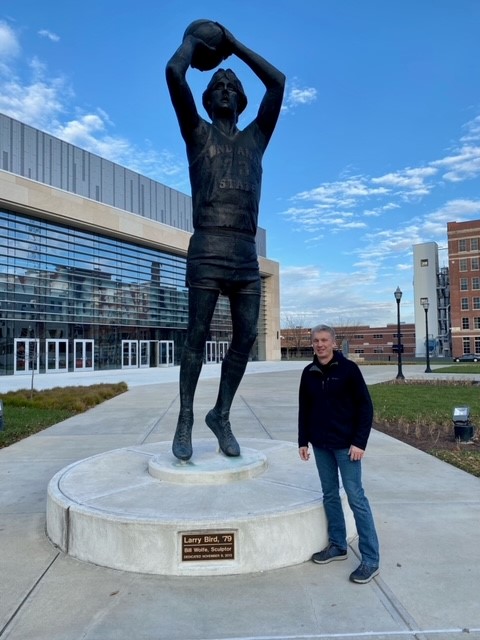Leadership communication lessons from Larry Bird
March 10, 2022

With basketball’s regular season nearing completion and the NCAA tourney just around the corner, it’s a fitting time to pay homage to arguably one of the best basketball players ever.
Larry Bird, who led the Indiana State University Sycamores to national prominence in 1979 and then helped the Boston Celtics capture three NBA titles during his 13-year professional playing career, is immortalized in Terre Haute, Indiana, by a 15-foot-tall statue that’s a fitting tribute for someone who is a legend in basketball circles worldwide. Just Google his stats and you will see what I mean.
Bird had a simple, soft-spoken manner in public – an “I’m just a country boy from French Lick, Indiana” vibe – which was a stark contrast to some of his professional contemporaries who were much more quotable and boisterous (think Charles Barkley, “Magic” Johnson or Michael Jordan). However, Bird was a fierce competitor on the court and an accomplished trash talker, who could back it up with his play.
When it came to communicating with the media, Bird usually kept it simple when sharing his thoughts. He never really offered a “wow”-type of interview, but there was also some downhome wisdom in the things he said. Here are five leadership communications-related tips we can learn from the words of Larry Bird:
1) “First, master the fundamentals.”
Lesson: Bird was a “gym rat” who understood the importance of practice. It kept him at the top of his game. Leaders also need to practice (and master) the fundamentals of communication, as it makes them more credible and effective. If you have an area of weakness, work on getting better at it and find ways to practice.
2) “Leadership is getting players to believe in you. If you tell a teammate you’re ready to play as tough as you’re able to, you’d better go out there and do it. Players will see right through a phony. And they can tell when you’re not giving it all you’ve got.”
Lesson: Bird expected a lot from himself and others, but he led by example and never coasted. When on the court, he was there to work and win. Employees can tell when leaders are coasting and not putting in the work. If you are communicating the importance of excellence, teamwork and working hard, you better be demonstrating it as well.
3) “In the closing seconds of every game, I want the ball in my hands for the last shot – not in anybody else’s, not in anybody else’s in the world.”
Lesson: Bird was the go-to-guy in crunch time, and everyone knew it. Sometimes it worked, sometimes it didn’t, but he never shied away from the spotlight. As a leader, people are going to expect you to be the face and voice of the organization, in both good times and bad. Given this, you need to be prepared to communicate in a way that reflects strength, confidence and credibility, no matter the situation.
4) “I don’t think that once you get to one level you can relax. You’ve got to keep pushing.”
Lesson: Bird didn’t rest on his laurels. Even though he was a top player during a new era of NBA mega-stars, he knew he had to keep working hard if he was going to maintain that level of success. Leaders, no matter their level of experience, need to keep communicating and finding new ways to stay connected with (and relevant to) many different stakeholders, both internal and external. Find new ways to communicate via different platforms and never assume everyone already knows what is going on – tell them.
5) “You’re all playin’ for second place.”
Lesson: Bird was the ultimate competitor – one who did whatever it took for his team to win, whether it was diving for loose balls, getting the crowd involved or being the primary scorer. He did it all, which is why opponents respected him and fans (especially in Boston) loved #33. Being a leader takes confidence and a little bit of swagger, so you need to communicate in a way that projects this, as well as your willingness to do what is best for the team to be a winner. If you want people to be “all in” for the organization, they need to believe you are “all in” for them – only then can you win together.

By: Mark Yontz
With more than 25 years of professional experience, Mark provides clients with a variety of communications support – from conducting strategy sessions and communication audits to developing plans and implementing tactics. He is also a media relations expert, having written or pitched more than 600 articles for a variety of local, statewide, regional and national publications including Family Living, The Spokesman, Teach & Travel, Farm Industry News, Michigan Living and many more.